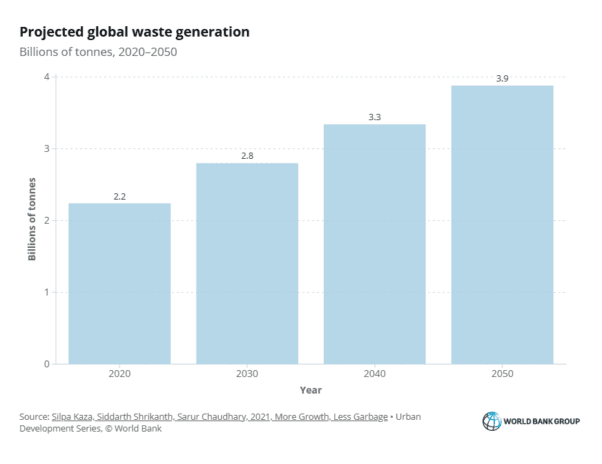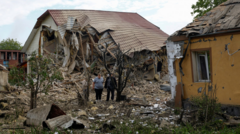By Ming Zhang, Kremena Ionkova and Sandrine Boukerche
Every year, the world produces over two billion tonnes of municipal waste, a figure expected to rise by 73 percent to nearly four billion tonnes by 2050. Managing this surge will be a major investment and policy challenge for cities in low- and middle-income countries.
Today, 23 percent of the waste produced globally goes uncollected, while 33 percent is openly dumped. In low-income countries, the problem is even worse—with 60 percent of solid waste going uncollected and 93 percent improperly managed. Without action, this volume of improperly managed waste will grow exponentially, harming health, economic development and the environment.

The World Bank’s response
As outlined in our latest results brief, the World Bank Group, as the world’s largest financier of solid waste management, is at the forefront of addressing this issue. By combining infrastructure financing with policy reform loans and results-based financing, the World Bank is driving more sustainable waste management solutions in cities around the world.
From 2003 to 2021, the World Bank Group provided approximately $5.1 billion in official development financing for solid waste management. This accounted for 35% of global official development financing in this sector.
We finance projects that include expanding waste collection, reducing open dumping, managing landfill gas, and diverting organic and recyclable waste. We also support waste minimization, separation, improved treatment, and stronger governance with reliable systems.
Additionally, the World Bank strengthens local governments’ institutional and technical capabilities through training, workshops, and strategic guidance. Projects often include capacity support to improve waste collection, treatment, and disposal while implementing incentives for measurable results.
The World Bank also conducts extensive research to guide policy and investments. Reports like our What a Waste series offer comprehensive data on global waste trends, with the third edition—What a Waste 3.0—scheduled to be published in early 2026. Other products include the Bridging the Gap in Solid Waste Management, Results-based Financing for Solid Waste Management, and Municipal Solid Waste Cost Calculation Technical Guidelines for Low and Middle-Income Countries reports.
Success stories
Over the past 20 years, the World Bank has helped countries to:
Improve waste management services: In Nepal, World Bank results-based payments helped expand waste collection to 120,000 households in five cities between 2013 and 2017, raising coverage to 70 percent. Meanwhile, in Ningbo, China, a World Bank-financed project improved waste segregation and recycling, benefiting over 900,000 households and exceeding targets by 130 percent between 2013 and 2020.
Strengthen institutions: In Bosnia and Herzegovina, a World Bank-financed project established intermunicipal boards to improve waste management, reducing the unserved population from 75 to 34 percent between 2008 and 2017. In Morocco, a World Bank project established a municipal solid waste governance framework, increasing national waste collection coverage from 44 to 96 percent between 2008 and 2017.
Enhance financial sustainability: In the West Bank and Gaza, a World Bank project improved the financial sustainability of waste collection operations, maintaining an 80 percent fee collection recovery rate and benefiting nearly one million people between 2019 and 2022. Meanwhile, a project in Monterey, Mexico generated revenue through carbon offsets, cleaning the air, supporting landfill operations, and providing clean energy to 730,000 people between 2005 and 2017.
Create jobs and growth: A World Bank-financed project in Greater Monrovia, Liberia strengthened community-based enterprises, formalised waste pickers, and trained over 100 female street sweepers between 2017 and 2024. It promoted a cleanliness campaign in the poorest neighbourhoods, and regularly engaged schools, churches, and public spaces, ensuring waste collection for almost 700,000 people.
The path forward
The World Bank will continue assisting low- and middle-income countries to create and adopt integrated, locally tailored solid waste management strategies. This includes prioritising waste reduction, recycling, resource recovery, and sanitary disposal while strengthening policies, institutions, infrastructure, financial sustainability, and community engagement.
Expanding international cooperation and financing for solid waste management will be crucial. Global initiatives like the Global Plastics Treaty offer opportunities to advance sustainable waste management and create more livable cities, improving health, economic development, and environmental resilience.
The World Bank’s support over the past two decades highlights the value of integrating investment financing, policy reforms, and results-based approaches to improve solid waste management. Once seen as a local issue, the increasing volume and complexity of waste have made it a global challenge requiring coordinated action.
By continuing to invest in and reform solid waste management, we can create cleaner cities and futures for all.
![]()
The post How the World Bank is tackling the growing global waste crisis appeared first on Caribbean News Global.
